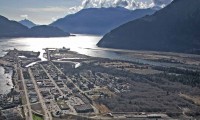Diverting Waste in the Construction, Renovation, and Demolition Industry
Waste diversion is a key goal of Council’s Strategic Plan. In 2017, the District of Squamish changed the Solid Waste Bylaw to require all businesses to divert waste. Simply put, everyone in Squamish needs to separate compost and recycling from their garbage in order to keep as much material out of the landfill as possible.
The Construction, Renovation, and Demolition (CRD) industry produces nearly one third of all waste in Canada. Here in Squamish, a waste audit conducted in 2018 found that 80% of the CRD material that ended up in landfill could have been composted. This means that the CRD industry is responsible for a great deal of organic material that ends up in landfills – material which could instead be converted into soil or fuel. Many businesses want to align their practices with their environmental concerns and wonder, how can we do better?
The first thing we can do is keep wood out of the Squamish Landfill. Wood does not compact very well, and therefore it fills up space at a much quicker rate than garbage. Because the Squamish Landfill is nearing the end of its life, diverting wood will help everyone in the community save money and extend its lifespan.
Wood also contributes to climate change. When wood breaks down in the Landfill it creates methane, a greenhouse gas up to 72 times more powerful than C02 (measured over 20 years). Landfilled organics, including wood, are a major contributor to climate change in Squamish.
Other common building materials that can be recycled include concrete, drywall, and metal. During renovation or demolition, many items can also be salvaged and reused in other buildings. By keeping materials circulating through the economy longer, we help reduce the waste that goes to the Landfill, which also helps reduce greenhouse gases.
Diverting waste can also save you money. The District of Squamish has introduced the Mixed Waste fee for any load that comes to the Landfill containing over 10% of recyclable materials. This fee is over twice the charge for regular construction waste and, under the Solid Waste Bylaw, you may also be fined up to $500 for not separating waste on site. Ultimately, these policies are in place to incentivize waste diversion and penalize those who are not managing contamination of waste appropriately.
For more information, visit squamish.ca/construction-waste.
July 17, 2020

